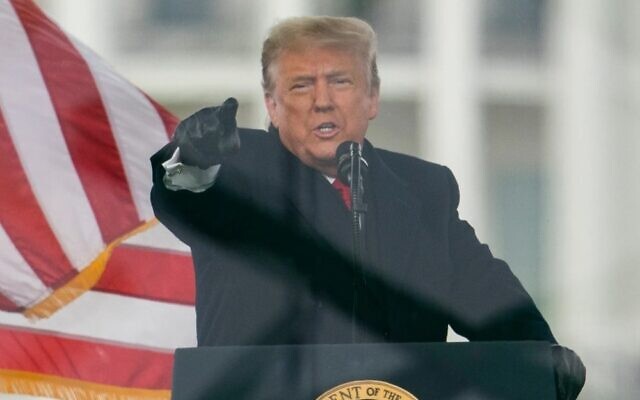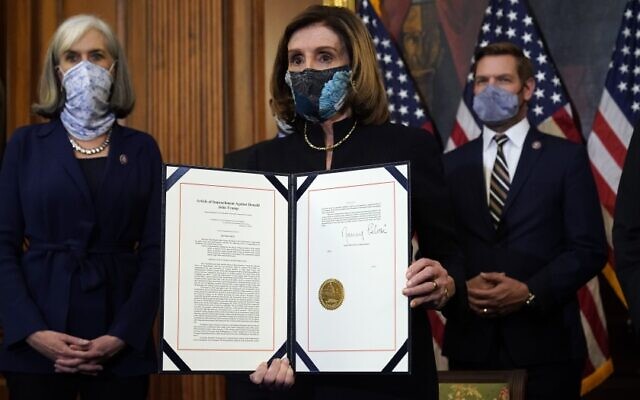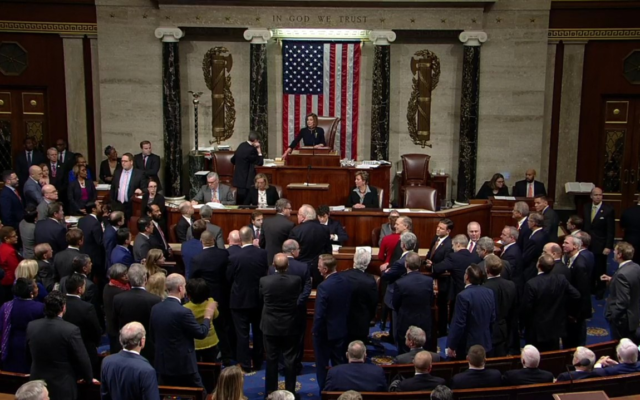Trump’s Impeachment Divides Jewish Community
The impeachment of a president is a legal issue, but one not easily separated from political considerations.
Dave Schechter is a veteran journalist whose career includes writing and producing reports from Israel and elsewhere in the Middle East.
Political and legal voices from Atlanta’s Jewish community have staked out differing positions on the second impeachment of President Donald Trump, who leaves office today.
Article 1, Section 2 of the Constitution gives the House of Representatives “the sole Power of Impeachment,” requiring a vote by the majority present. That happened on Jan. 13 by a 223-205 margin.
The House charged Trump with incitement to insurrection one week after Jan. 6, which began with him speaking at a “March for Trump/Save America” rally on The Ellipse. Crowd estimates vary, but the event permit listed 30,000. In the early afternoon, a mob battered its way into the Capitol, temporarily disrupting the constitutionally mandated certification of the Electoral College vote that made Joe Biden the 46th president of the United States. Trump’s four-year term ends today, when Biden takes the oath of office.

Article 1, Section 3 of the Constitution gives the Senate “the sole Power to try all Impeachments” and requires a vote by two-thirds of the members present to convict.
At this writing, what comes next is uncertain. House Speaker Nancy Pelosi will send the article of impeachment to the Senate. This is where Georgia’s new Democratic senators Rev. Raphael Warnock and Jon Ossoff come into play. The Senate now is knotted 50 Democrats (including two independents in their caucus) and 50 Republicans, with tie-breaking votes going to Vice President Kamala Harris. Control of the Senate calendar, and thus the scheduling of any trial, shifts to Democratic Sen. Charles Schumer of New York, who replaces Republican Sen. Mitch McConnell of Kentucky as majority leader.
If there is a trial and if Trump is convicted, a second vote, requiring only a majority of the members present, would determine whether his punishment includes “disqualification to hold and enjoy any Office of honor, Trust or Profit under the United States.”
In the nearly 244 years since the Constitution was written, only three presidents have been impeached: Andrew Johnson, Bill Clinton, and Trump, twice. Trump was impeached Dec. 18, 2019, on charges of abuse of power and obstruction of Congress and acquitted by the Senate Feb. 6, 2020.

Attorney Marc Hershovitz called the events of Jan. 6 “the worst peril this country has faced since Pearl Harbor, if not since the Civil War because of what has occurred and what looks like an ongoing situation.” He has no doubt about what should happen. “You go forward with the trial,” he said.
Hershovitz, whose resume includes work with political candidates and campaigns, said Biden may not want the political headaches that could come with his predecessor put on trial but, “There was an insurrection seeking to overthrow the democratically elected government of the United States.”

Attorney David Schoen believes that an opportunity was lost in the aftermath of Jan. 6. “I think that the impeachment was a terrible idea for the country. In his first speech after the election, President-elect Biden called for healing and unity. This impeachment reflects a very different agenda from that and will ensure even further polarization. I am disappointed that President-elect Biden failed to speak out against it. He might not have stopped it — and might not have wanted to stop it — but it would have been the statesmanlike thing to do and would have gone a long way,” he said.
Schoen referenced a CBS “60 Minutes” interview with Pelosi that aired Jan. 10, particularly her statement that preventing Trump from running again for president was one reason “that people have for advocating for impeachment.”
Schoen said, “We see a complete politicization of the constitutional impeachment process for strictly partisan purposes and that is very dangerous. It also demeans our democratic process and the American voter.”

Laura Weinstein, who is active in the Republican National Coalition, views the impeachment as politically motivated. “It has been confirmed by several reputable attorneys, including Alan Dershowitz, that impeachment cannot occur once a president has left office. This is according to the Constitution, and the Senate should adhere to it. Additionally, the House rushed through the impeachment process without having a hearing, which is purely political. It was vindictive and spiteful. The House called for impeachment, but based this claim on the president’s speech, which clearly stated, ‘march to the Capitol and be peaceful and patriotic,’ which in itself does not incite violence,” Weinstein said.
Dershowitz, who was part of Trump’s defense team in the first impeachment, has said that Trump’s speech is protected by the First Amendment. He told Fox News that “the Constitution specifically says the president shall be removed from office upon impeachment,” but the Senate’s “jurisdiction is limited to a sitting president.”
Former Georgia Attorney General Sam Olens takes a different view on the First Amendment issue. “The president’s actions of January 6 are indefensible. Inciting an insurrection is not protected free speech,” he said.

Politically, “The trial would limit the amount of time the Senate could work on the president-elect’s agenda, potentially aggravated by the cloture rule, which requires 60 votes to end debate on most items. In other words, assuming there is a strong case for conviction, it will distract from the president-elect’s agenda,” said Olens, now a lawyer in private practice.
As to whether the Senate can try a former president, Emory University law professor Michael Broyde said, “I think that the better technical read of the Constitution in a vacuum is that only people who are current civil officers of the United States can be impeached, although the counter argument –- that impeachment has only two punishments, removal from office and banishment from holding future office — is technically possible.”

Broyde, who is senior fellow and projects director at the Center for the Study of Law and Religion at Emory, is among legal scholars who cite a possible precedent.
On March 2, 1876, William Belknap resigned as secretary of war to President Ulysses S. Grant, but later that day the House impeached him, alleging that Belknap “criminally disregard(ed) his duty as Secretary of War, and basely prostitut(ed) his high office to his lust for private gain.” The resignation did not stop the Senate from holding a trial during April and May 1876. A majority of the senators voted against Belknap, but not the two-thirds required for conviction. Thus, Belknap was acquitted and did not face further prosecution.
As regards Trump, attorney Michael Rosenzweig, a national board member of the Jewish Democratic Council of America, said, “The appropriate next step in the impeachment process is a trial in the Senate.”
Rosenzweig acknowledged that the political math might make conviction difficult. In a full Senate, assuming that all 50 Democrats voted to convict, 17 Republican votes would be needed. The fewer senators present, the lower the number that would be needed for conviction.

He suggested that “some Republicans may simply stay away in order to avoid having to take a position, which would make conviction easier. … The fact that the Democrats will be in control of the Senate is less significant than some might think, though it would be very significant if Trump is convicted, because there would then be a separate vote to bar him from public office forever, and that requires only a majority vote,” Rosenzweig said.
“But all this aside, the important thing, I think, is the principle at stake here, that the country cannot heal without accountability. Quite simply, Trump incited violent insurrection against the government of the United States in stark violation of his oath of office, and justice demands his conviction in the Senate.”







comments